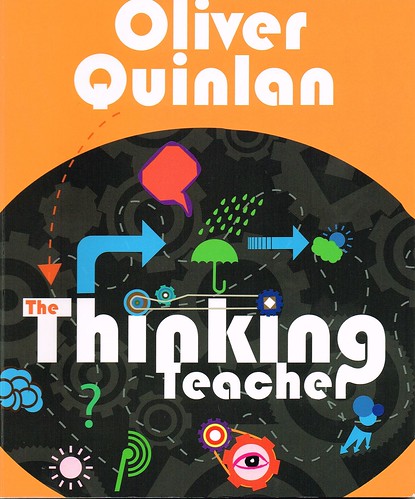Review of The Thinking Teacher
When I first picked up this book I made an error of judgement. Noticing that it seemed quite slim, I thought I could finish reading it in just one or two sessions. However, what I had not counted on was the book’s living up to its title. In short, it made me think. It made me think about what the author was saying in its own right, that is whether or not I agreed with it. It also caused me to reflect on my own practice as a teacher and, now, as a consultant.
Quinlan’s outlook may be summed up, in his own words, as:
“If we want thinking children, we need thinking teachers.”
 Oliver Quinlan's book, The Thinking TeacherAbsolutely correct. I have been concerned for some time now that the effect of well-intended but, in my opinion, misguided help provided to teachers in the form of various “strategies” was to convey the unfortunate hidden message that teachers didn’t need to think too much as long as they followed the procedure laid down by some unknown “expert”.
Oliver Quinlan's book, The Thinking TeacherAbsolutely correct. I have been concerned for some time now that the effect of well-intended but, in my opinion, misguided help provided to teachers in the form of various “strategies” was to convey the unfortunate hidden message that teachers didn’t need to think too much as long as they followed the procedure laid down by some unknown “expert”.
Interestingly, Quinlan touches on this type of thing, albeit in relation to children. Provide too much help, and you don’t allow the children the time and space to get to grips with the problem and work out their own strategies for coming to a solution. It will be interesting to see how far well-meaning and dedicated teachers provide “too much” help to children in writing and debugging programs.
Although, as I have said, the book is slim, it punches above its weight. That’s because it adopts a challenging – though not confrontational – approach.
Drawing on fields as diverse as high finance, programming and lifestyle management, Quinlan says, in effect:
“This is what we as teachers think or how we behave; this is what such and such an expert in this completely different field says; what if we applied that outlook to teaching?”
Although I don’t agree with everything that’s said, the approach works. In fact, whether or not I agree with it is irrelevant. The aim was to get me, the reader, to think, and in that sense the book succeeds admirably.
I like the fact that Quinlan enjoins teachers to think about how their background and other factors have shaped their individual ideology, and how that affects their outlook and practice.
He makes a good case for the memorisation of certain kinds of knowledge, such as the multiplication tables, in order to have at our disposal information that can help us solve problems, rather than relying on search engines to help us solve very specific problems. He might also have mentioned the in-built bias of search engines.
I very much agree with his comment that :
“Theories don’t tell teachers what to do, but instead provide a structure in which to think about what they do.”
He also makes a very good point about “smart regulation” – something that Ofsted does not provide – ie one that judges by outcome rather than by process. (Derek Blunt makes some interesting points about the “Ofsted lesson” elsewhere in this newsletter.)
Quinlan states that:
“There is no guarantee that all of the learners in a class are going to be engaged by the same topic.”
True, although I maintain that a good teacher in the right conditions can make any topic engaging for any pupil.
He also makes some interesting points about the “minimum viable lesson” and, in effect, the “good enough” lesson, in his exhortations against the (understandable) predilection of many teachers to work ridiculously long hours in the quest to produce the perfect lesson.
He might have drawn on the economist’s toolkit here. It is well-known by students of “the dismal science” that the old adage “If a job is worth doing, it’s worth doing properly”, does not hold up in reality. Why not? Because of the cost in terms of all the other things that cannot be achieved instead. Sleep, for example, or marking and feedback perhaps, or even the teacher’s own professional development.
Quinlan also underlines the importance of teacher expectations on the performance of their pupils.
There are a couple of things I do not like about the book. First, it doesn’t mention www.ictineducation.org in its list of recommended blogs. More seriously, there is no index, which I found frustrating.
Nevertheless, provocative, in a gentlemanly way, and drawing on a wide range of research and perspectives, The Thinking Teacher is a book that, were I still a Head of Department in a school, I would buy for each member of my team and insist that they read it.
They and you may not agree with Quinlan or even with each other, but I suggest that the experience of your pupils would be all the richer as a consequence.
The Thinking Teacher (affiliate link) by Oliver Quinlan.
This article first appeared in Digital Education, the free newsletter for those with a professional interest in educational ICT and Computing.
 No need to fight to get your hands on a copy of Digital Education, the free e-newsletter for education professionals! Subscription is free. Have you subscribed yet?
No need to fight to get your hands on a copy of Digital Education, the free e-newsletter for education professionals! Subscription is free. Have you subscribed yet?
Read more about it, and subscribe, on the Newsletter page of the ICT in Education website.
We use a double opt-in system, and you won’t get spammed.